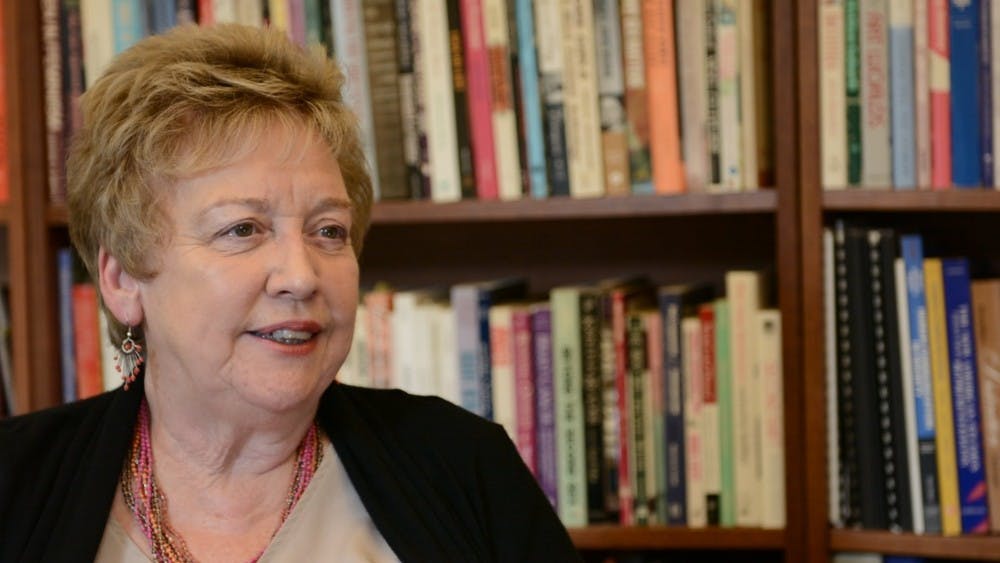
College lecturer and Executive Director of the Women’s Law Project Carol Tracy has always stood up to those in charge.
As a sixth grader, in what she described as her “first political act,” Tracy was kicked out of class for arguing with a teacher who criticized Elvis Presley.
Her penchant for protest continued when she enrolled as an undergrad at Penn.
From 1969 to 1970, while taking night classes and working in the city planning department of the Graduate School of Fine Arts, she helped to organize unionized cafeteria workers and anti-war advocates in a protest that resulted in an improved contract for the workers.
It was also during this period that Tracy began to take note of the mistreatment of certain groups in Penn’s community. She said she felt that her dual roles as a night student and a secretary at the Graduate School of Design made it more difficult for her to participate in the mainstream Penn community.
“People talk about the community at Penn and it was faculty and students and it’s like, well am I chopped liver? I have a role here, and don’t I have an opinion?” she said. “But the women’s faculty, they welcomed me into their ranks.”
After increasing her involvement in the women’s faculty community at Penn, Tracy became more outspoken about women's rights. As a College of Liberal Arts for Women junior and President of the Women for Equal Opportunity group, Tracy staged an on-campus protest in 1973 criticizing the police’s handling of a gang rape and demanding better resources for rape prevention. Among the demands of the protestors involved in the four-day sit in was the creation of a center for women. This ultimately led to the creation of the Penn Women's Center.
Tracy graduated from the College with a degree in history in 1976, and went on to become the director of the PWC. During her tenure at the PWC, she had to confront incidents such as a gang rape by members of the Alpha Tau Omega Fraternity in 1983, a case that “caused bitter schisms on the campus.” She was also simultaneously attending Temple University’s Beasley School of Law, pursuing her J.D.
“My intention was to be a women’s rights lawyer, and I found that there were maybe 20 jobs in the United States and frankly, oh shit what am I gonna do?” Tracy said.
Tracy knew she needed to gain practical legal experience and decided upon graduation in 1983 that she had to leave her job at the PWC to work full-time as a lawyer.
She worked in various fields of law until 1990, when she came across a job opportunity that aligned with her aspirations.
“I was a code enforcement lawyer for a couple of years, and then I went to a small, private law firm to do employment discrimination work and then my dream job opened,” Tracy said. “The person who was the Director of the Women’s Law Project retired.”
Tracy became the executive director of the Women's Law Project that year and has worked there ever since. At the Women's Law Project, she has been involved in landmark women’s rights court cases, including Planned Parenthood v. Casey, a monumental supreme court case challenging abortion rights established in Roe v. Wade.
She also helped to transform the way the Philadelphia Police Department handles rape, working as the leader of an external investigation committee which audits rape cases under the jurisdiction of Philadelphia Police Department's Special Victims Unit.
Penn Division of Public Safety Vice President Maureen Rush, who has worked with Tracy on multiple occasions, said Tracy’s success in promoting women’s rights lies in her ability to form and maintain relationships.
“She can push forward agendas without creating a lot of enemies,” Rush said. “She can take very difficult situation like one I mentioned with [Philadelphia Police SVU], and go into uncharted territory and find ways to make it work.”
In addition to her legal endeavors, Tracy also teaches a gender, sexuality and women’s studies course at Penn titled "Law and Social Policy on Sexuality and Reproduction." She advocates a no-stress policy for her class.
College junior Elena Prieto, who is enrolled in her class, said she felt Tracy taught the class in a balanced manner. She said Tracy has shifted her perspective and opened her eyes to how much society has changed from when Tracy was beginning her career as a lawyer.
“It was honestly kind of inspiring...when she was explaining how important different things were when they were changed, she had to also backtrack and explain how everything [culturally and politically] was different,” Prieto said.
Another student in Tracy’s class, College junior Ellie Harned, agreed. She explained that in addition to discussing sexuality and reproduction related Supreme Court cases and their relation to modern day society, Tracy makes her class “a forum” for discourse on life at Penn.
College senior Shoshana Segal-Miller, also a student in Tracy’s class, was appreciative of the view point Tracy brings to these discussions and the way she motivates students to take action.
“She doesn’t necessarily agree with everything we are saying...she is good at putting [things] into perspective and reminding us that we can’t just be angry in a vacuum,” Segal-Miller said.
Tracy’s achievements have been recognized beyond the classroom. This past June, she was the recipient of the Sandra Day O’Connor Award, a prestigious award that recognizes legal work in advancing the rights of women and girls.
“It was very very important, there’s no question about it, to be honored by your peers,” Tracy said. “I’ve been really lucky, that I’ve gotten so much recognition.”
The Daily Pennsylvanian is an independent, student-run newspaper. Please consider making a donation to support the coverage that shapes the University. Your generosity ensures a future of strong journalism at Penn.
Donate







